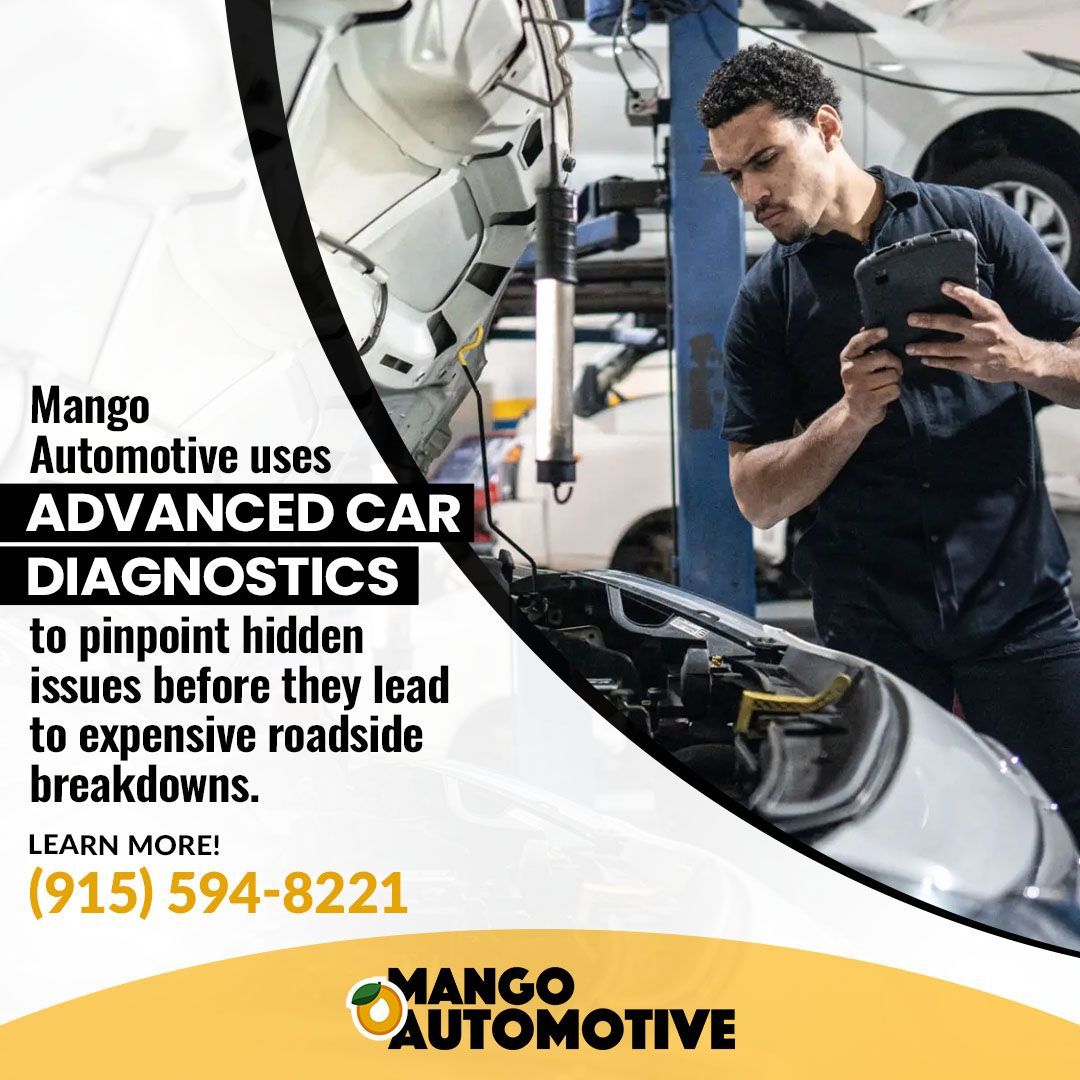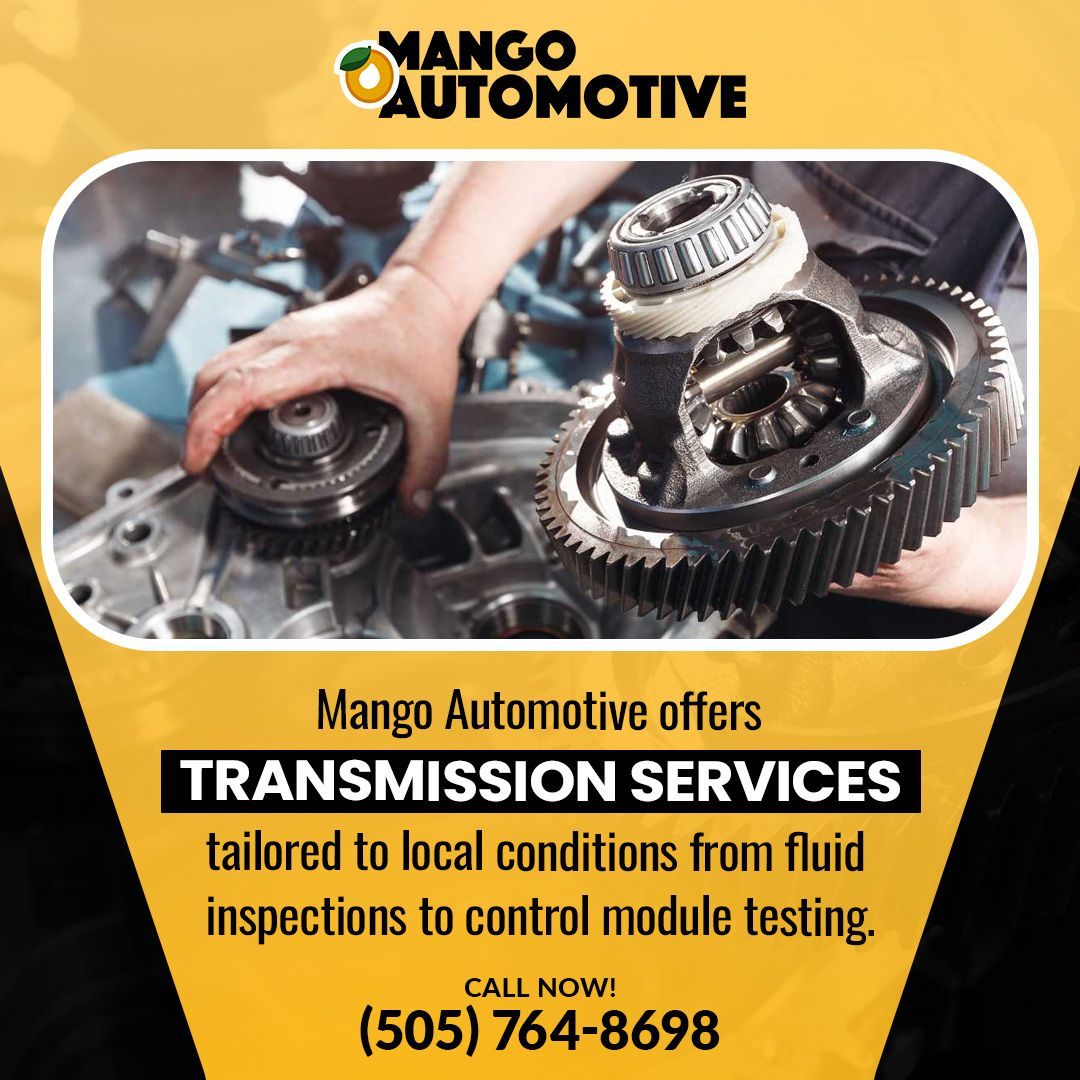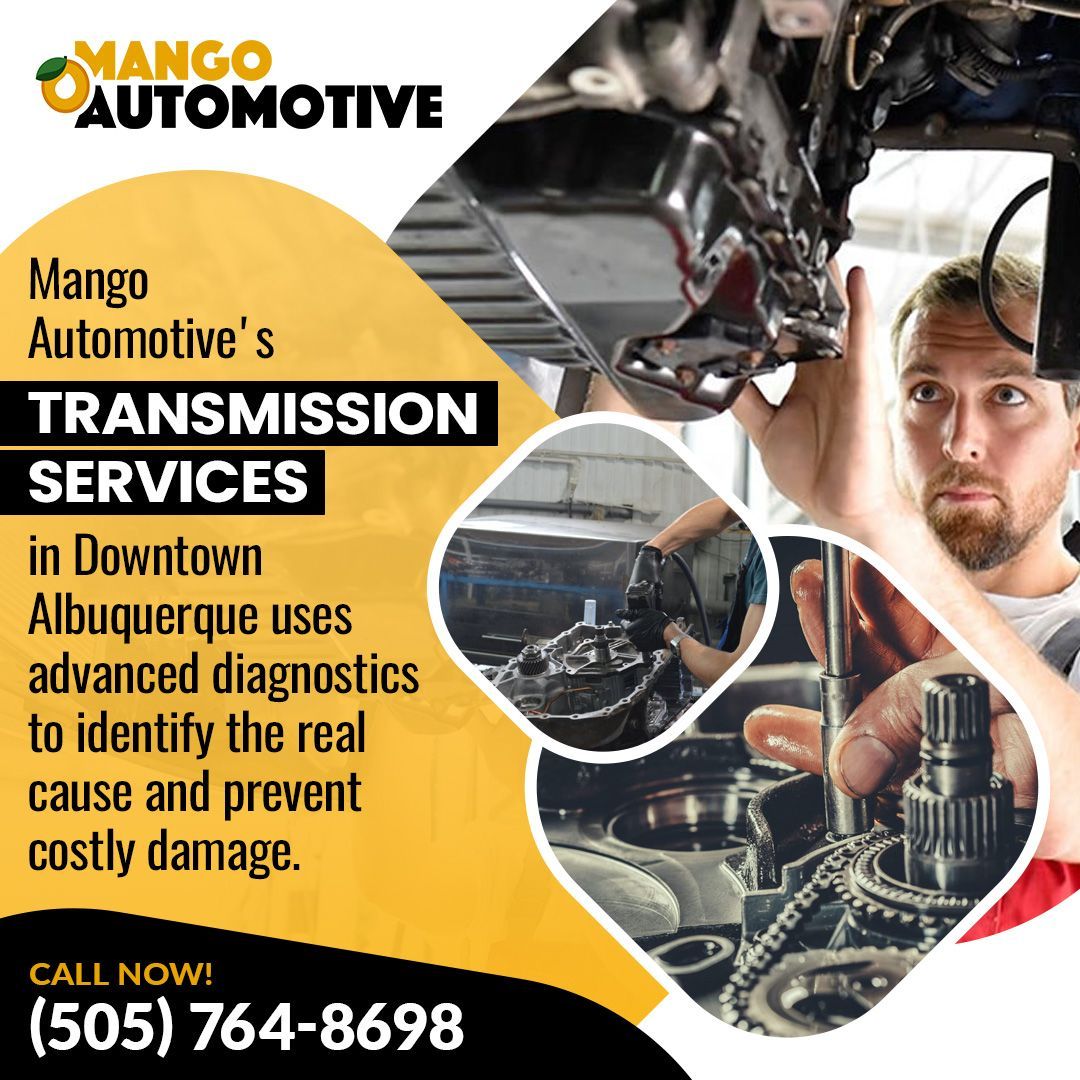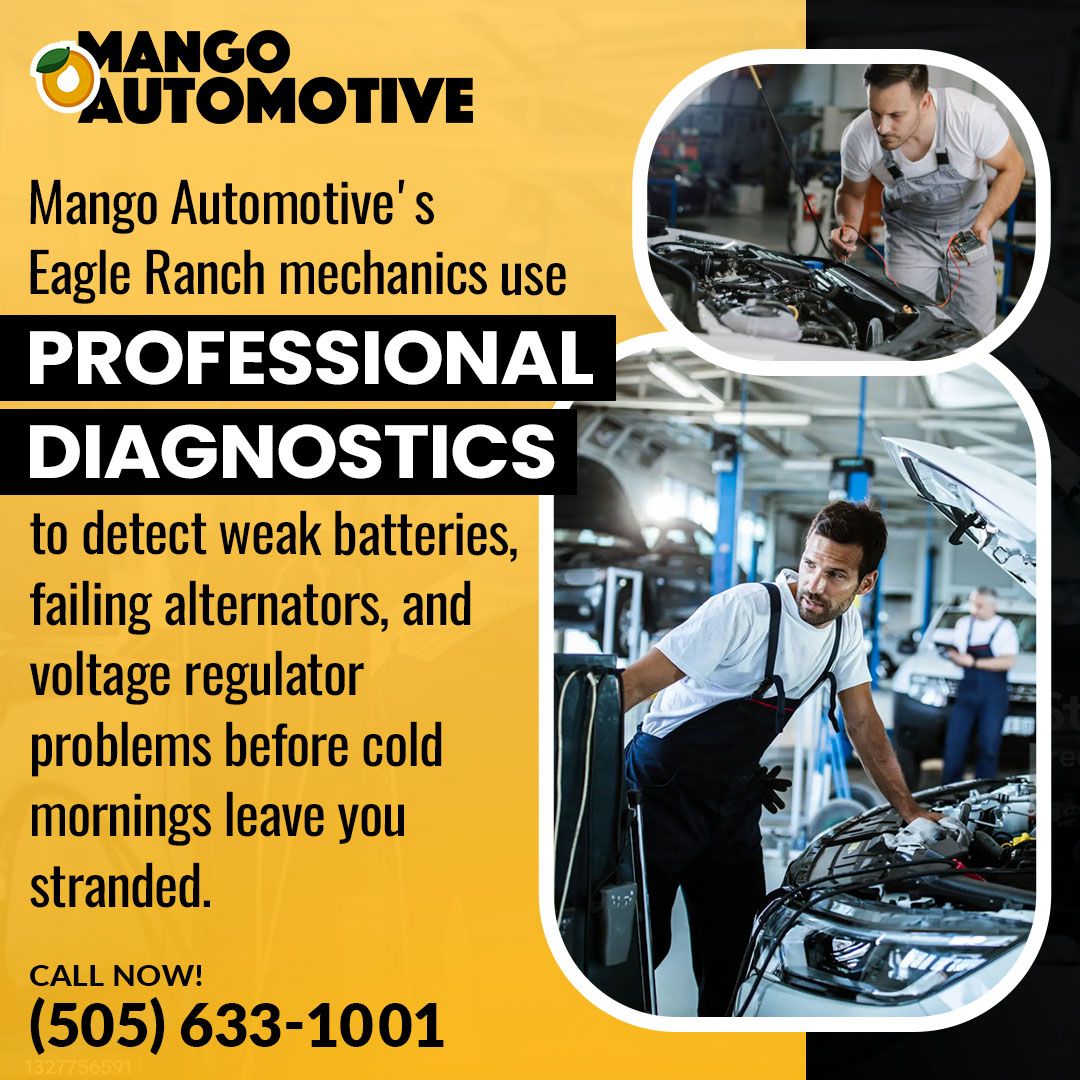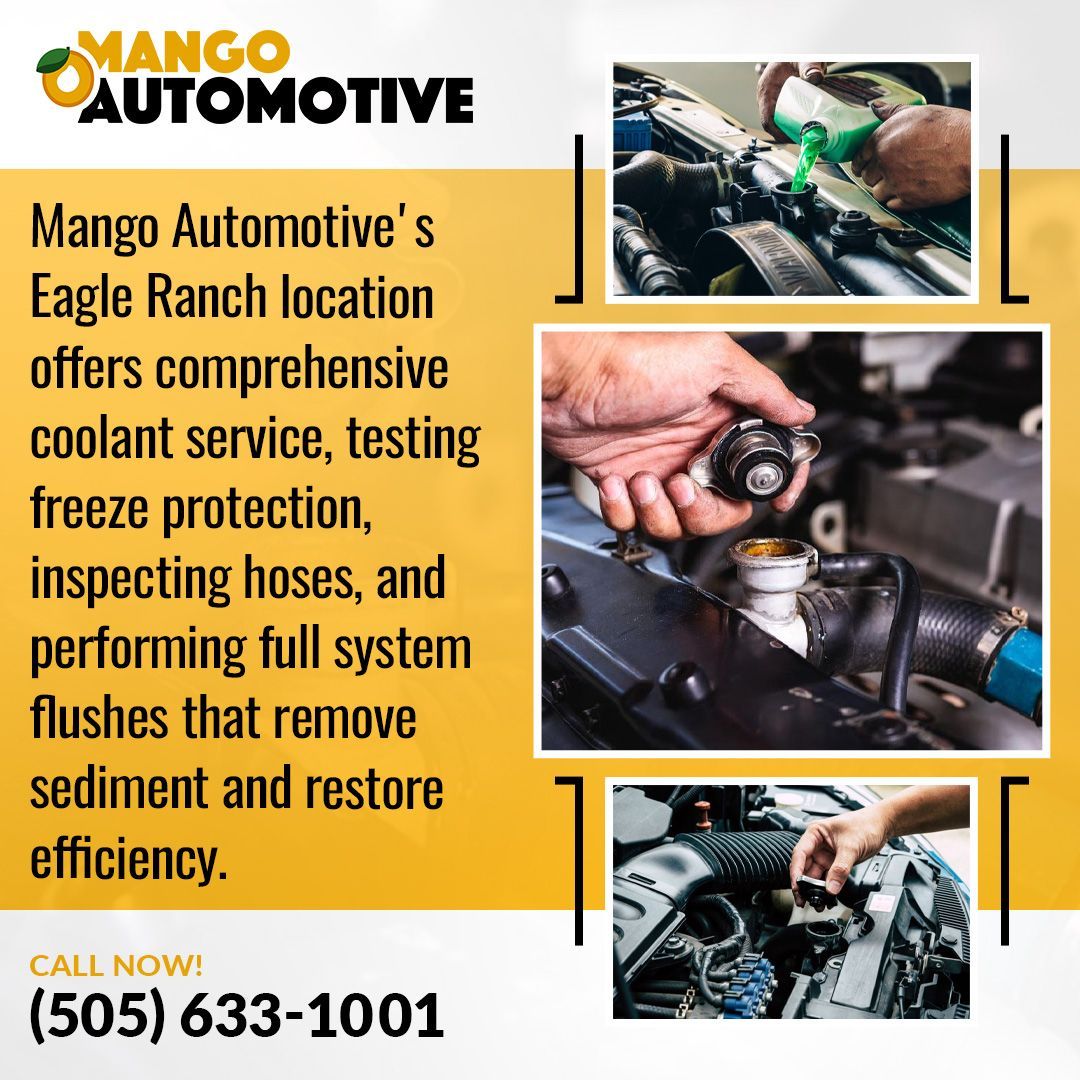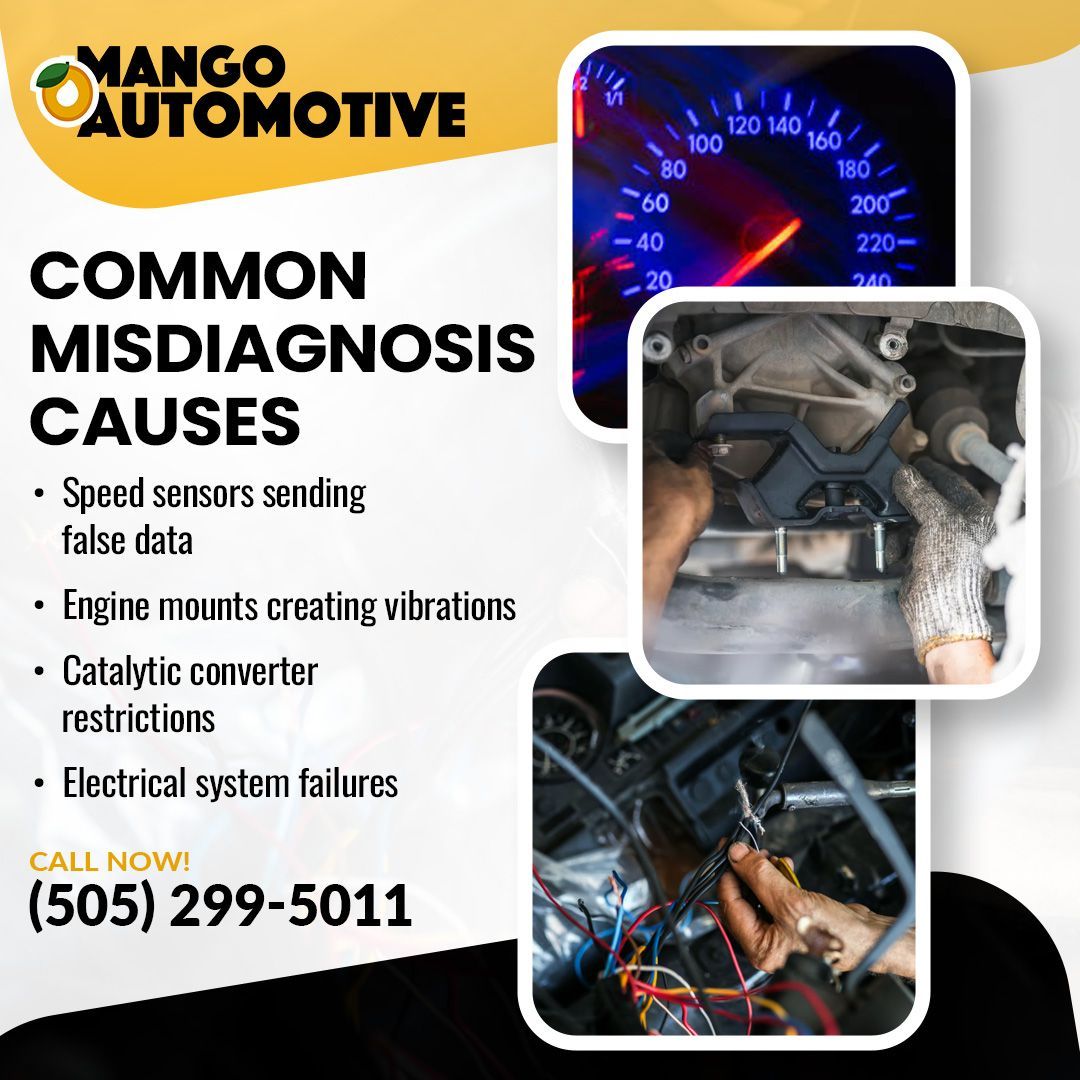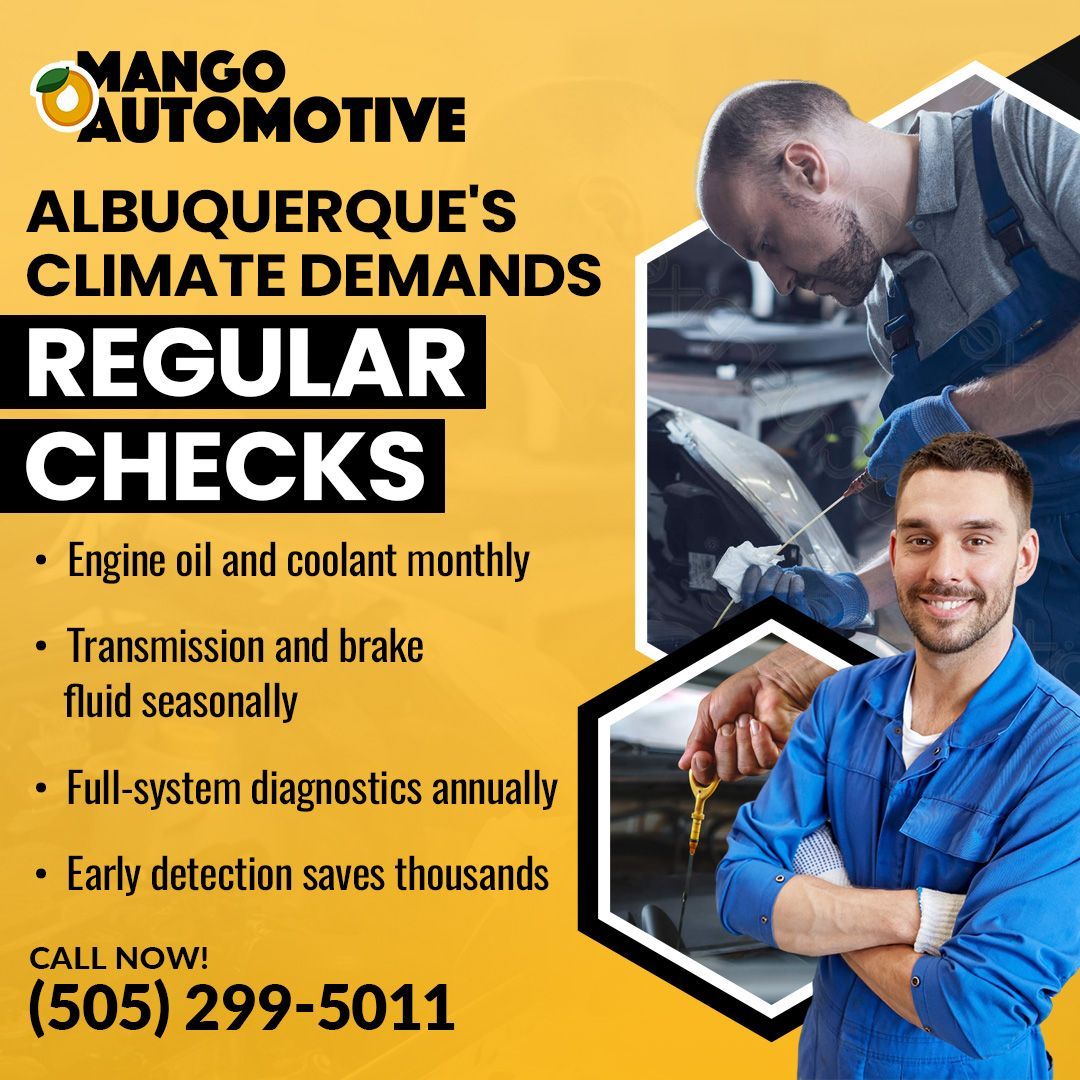The Unique Auto Repair Needs of SUVs vs. Sedans in Albuquerque
SUVs and sedans require different approaches to repair because of their design, size, and mechanical systems. These differences affect everything from suspension performance to drivetrain wear and brake system service. Understanding these distinctions helps vehicle owners make better decisions when visiting an auto repair shop.
At
Mango Automotive in Albuquerque, we encounter these variations daily. This article will guide you through how your vehicle’s design affects its maintenance and repair needs, whether you’re driving a daily-use sedan or an SUV for family travel or off-road adventures.
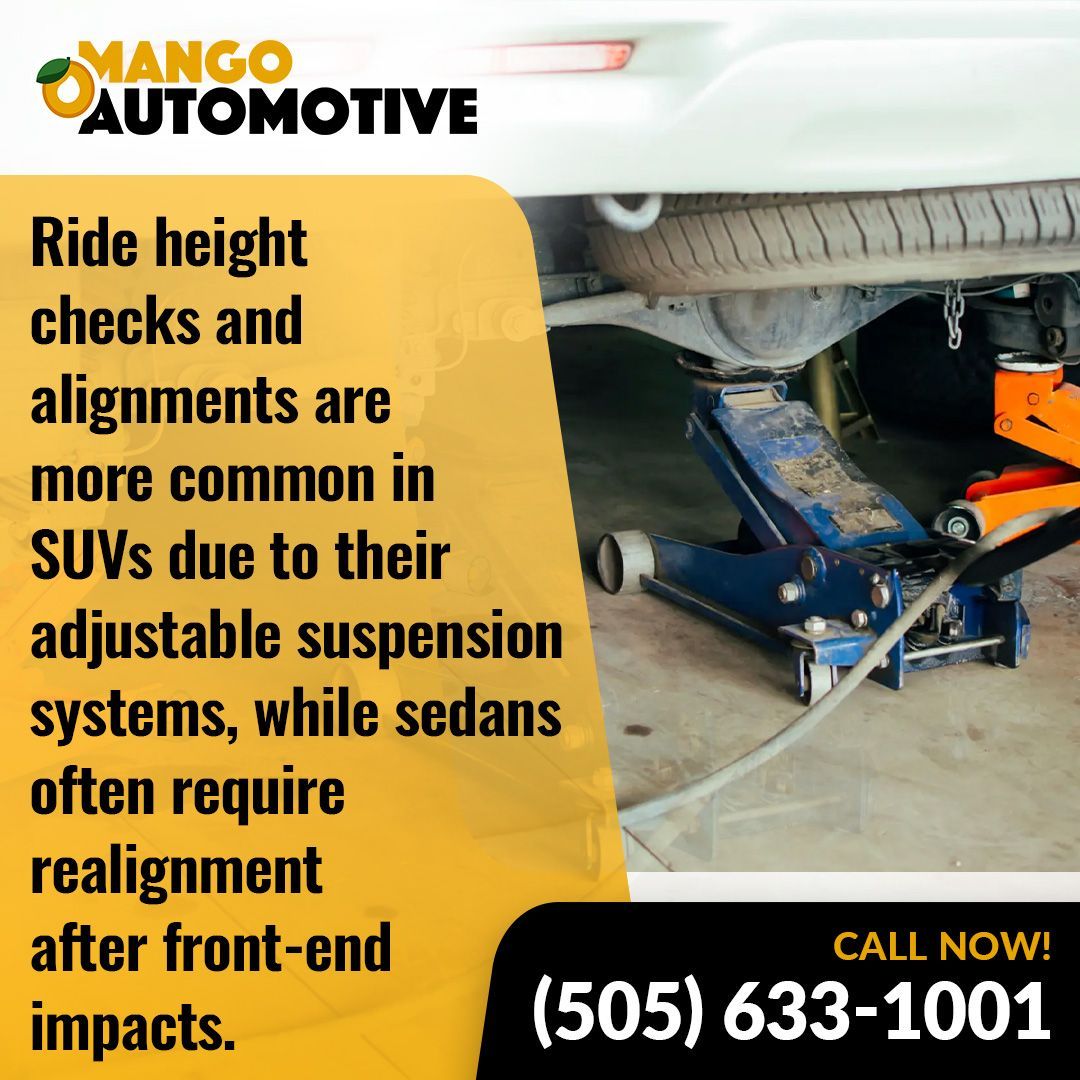
Why Vehicle Type Affects Repair Requirements
Vehicle type directly influences how often and what kind of repairs are needed. SUVs and sedans differ in weight, suspension, engine load, and drivetrain design. These structural differences affect how each vehicle handles stress, road conditions, and daily wear.
For instance, SUVs usually have higher ground clearance and four-wheel drive. This setup helps with off-road or rough terrain, but increases wear on suspension parts. Sedans, with lower clearance and lighter frames, face more issues related to undercarriage scrapes and tire alignment from potholes and curb impact.
SUVs accounted for 46% of global car sales in 2022. This means more drivers face the repair needs unique to heavier and more complex builds. This growing SUV ownership makes it important for auto repair shops to offer services that match specific vehicle demands.
At Mango Automotive, we assess not just the model but also how it’s driven in real local conditions. That includes factoring in road types, climate effects, and common driving habits in Albuquerque.
Differences in Design and Performance Expectations
SUVs are built for durability and load, while sedans are built for fuel economy and agility. This contrast impacts maintenance intervals, component stress, and failure points. For example, SUVs often tow or carry heavier loads. This stresses the transmission and brakes more than in typical sedans. In contrast, sedans are often designed for efficient city driving, which means more frequent stop-and-go traffic wear on brake pads and rotors.
Another key difference is drivetrain configuration. Most sedans use front-wheel drive. Many SUVs use all-wheel or four-wheel drive systems. These systems require special fluid checks, transfer case maintenance, and differential service, especially in areas like Albuquerque, where off-road travel is common in surrounding areas.
These design choices change how shops like Mango Automotive plan routine maintenance. A sedan needing a basic oil change schedule might also need regular transmission fluid checks, while an SUV may require added inspections of CV joints and suspension mounts.
Local Driving Conditions in Albuquerque and Their Impact
Hot weather, elevation, and mixed road surfaces in Albuquerque increase repair frequency for both SUVs and sedans. Temperatures in Albuquerque regularly reach above 90°F in summer. This heat accelerates engine coolant degradation, tire pressure changes, and battery wear. SUVs are particularly affected due to higher engine loads.
Albuquerque’s elevation (over 5,000 feet) also affects engine performance. Air is thinner, which slightly reduces horsepower and changes how fuel systems operate. Both sedans and SUVs may need adjusted fuel-to-air mix evaluations more often than in sea-level cities.
Rural and suburban parts of the city often have rougher roads or unpaved stretches. These surfaces lead to faster suspension wear and misalignment, especially for heavier vehicles like SUVs.
At Mango Automotive, SUV owners come in regularly for realignment and undercarriage inspections after weekend camping trips or commutes over dirt roads. Sedans, while less likely to go off-pavement, often face tire wear from curb impact and rough pavement. Matching vehicle type with how and where it’s driven helps avoid unnecessary automotive repairs and reduce long-term maintenance costs.
Suspension Systems
Suspension systems manage ride comfort, steering control, and vehicle stability. SUV and sedan suspensions are designed for different stresses and road conditions. A suspension system connects the vehicle's frame to its wheels and includes parts like struts, shocks, bushings, and control arms. These components absorb impact and support the vehicle’s handling.
Load-Bearing in SUVs vs. Lightweight Sedans
SUVs carry more weight and require stronger suspension parts than sedans. An average SUV weighs about 4,500 pounds, compared to 3,000 pounds for a midsize sedan. This extra weight places more stress on suspension components such as springs, struts, and sway bars.
SUVs often come with load-bearing or self-leveling suspension systems. These are designed to handle cargo, towing, and uneven terrain. Sedans, being lighter and more road-focused, use smaller struts and shocks optimized for smoother surfaces.
Common Suspension Repairs in Each Class
SUVs often need spring, shock, and control arm repairs; sedans more often need bushing and strut replacements.
Wear on Bushings, Struts, and Control Arms
Rubber bushings, struts, and control arms wear faster in vehicles driven on rough or uneven roads. Bushings cushion suspension joints, but they crack and dry out in hot, dry climates like Albuquerque. SUVs tend to wear out rear control arm bushings faster due to heavier loads and frequent movement on uneven terrain.
Struts, which combine shock absorption and structural support, are critical in both SUVs and sedans. In sedans, front struts wear out more quickly from braking pressure and frequent turning. In SUVs, rear struts wear faster, especially under load.
Control arms also wear from joint movement. A loose or damaged control arm affects wheel alignment, steering, and tire wear. At Mango Automotive, our
Albuquerque auto repairs often involve control arms replacement in older SUVs and bushings in high-mileage sedans.
Alignment Needs and Ride Height Adjustments
SUVs require ride height checks, while sedans need alignment after front-end repairs. SUV suspensions are taller and more flexible. Changes in load or wear can affect ride height, which then impacts handling and tire wear. Ride height adjustments may be needed after replacing springs or shocks.
Sedans, due to their lower stance and compact suspension, are more prone to alignment issues after hitting potholes or curbs. Misalignment leads to uneven tire wear and poor steering response.
At Mango Automotive, we use alignment tools suited for both vehicle classes, which helps extend tire life and improve vehicle safety.
Brake System Service
Brake systems wear differently in SUVs and sedans due to weight, driving habits, and road conditions. Each vehicle type requires different brake maintenance intervals, part sizes, and replacement schedules.
Brake Size and Heat Tolerance
SUVs have larger brakes with higher heat resistance due to their weight. SUV brakes are designed to stop heavier vehicles, often with added cargo or passengers. Their rotors are wider, and calipers apply more clamping force to handle increased load. In sedans, brakes are smaller and optimized for lighter use. They perform well at lower speeds but may overheat faster if driven aggressively or downhill for long periods.
At Mango Automotive, our Eagle Ranch auto repair technicians often install vented rotors and high-friction pads on SUVs used for towing or mountain driving to manage heat buildup.
Typical Wear Patterns in Albuquerque Traffic
Urban driving causes faster brake pad wear, especially on front wheels. Frequent stops, short trips, and traffic lights accelerate front brake wear. Sedans often show uneven pad thickness from hard braking or warped rotors due to heat cycling.
SUVs may also wear rear pads faster when equipped with electronic brake-force distribution or trailer brake assist. This shifts some braking power to the rear wheels. Brake pad life in vehicles driven primarily within Albuquerque city limits is shorter, particularly in areas with steep terrain like the Westside.
Warning Signs for Sedans
Squealing, vibration, or soft pedal feel are early signs of brake wear in sedans. Brake squeal often comes from worn pads reaching their wear indicators. Vibrations through the steering wheel suggest rotor warping. A soft pedal may point to air in the lines or old brake fluid.
Sedans with front-wheel drive are more likely to develop front-end brake issues first. At Mango Automotive, our auto repair technician frequently addresses vibrating brake pedals and uneven pad wear in compact and midsize sedans.
Early Wear Indicators for SUVs
Longer stopping distances and brake fade under load are signs of SUV brake wear. SUV drivers may notice it takes more pressure to stop the vehicle or that brakes lose effectiveness when towing or descending hills. This usually points to glazed pads or overheated rotors. Brake system warning lights may also signal low fluid or worn pads. Intermittent grinding or pulsing under load is common, especially in SUVs used for weekend travel or light off-roading.
Powertrain and Drivetrain Differences
Powertrain and drivetrain maintenance needs vary considerably between SUVs and sedans due to differences in engine load and drivetrain configuration.
Engine Load and Transmission Functionality
Greater engine load in SUVs impacts the transmission more than sedans. SUVs, with their heavier weight and higher towing capacity, put more strain on the engine and transmission. This leads to more frequent issues like overheating or transmission fluid breakdown.
Sedans, typically lighter and less used for towing, often experience smoother transmission operations and less frequent fluid changes. However, frequent short trips or aggressive driving can still wear down the transmission faster.
At Mango Automotive, we recommend regular transmission fluid checks for both types of vehicles to maintain peak performance. For high-mileage SUVs, a transmission cooler upgrade may be necessary to prevent overheating.
AWD (all-wheel drive) and 4WD (four-wheel drive) Maintenance in Larger Vehicles
AWD and 4WD systems in larger vehicles need more frequent checks due to added complexity. For example, the transfer case, which distributes power to the wheels, must be serviced regularly. Failing to do so can result in fluid leaks or gear damage, leading to costly repairs. In contrast, sedans typically have front-wheel drive (FWD) systems, which are less complex and easier to maintain. The most common issues here are related to CV joints and axles.
At Mango Automotive, we handle a range of Albuquerque auto repair needs, including drivetrain stress in SUVs used on mixed terrain and steep elevation changes, as well as in sedans.
Fluid and Filter Services
Fluid and filter services are essential for the health of any vehicle, but the frequency and type of maintenance vary based on the vehicle's weight and usage. For both SUVs and sedans, regular fluid and filter checks ensure the longevity of engine components and drivetrains and avoid complex and expensive automotive repairs. However, the heavier and more demanding an SUV is, the more frequently these services need to be performed, especially for the transmission and differential fluids.
Impact of Vehicle Weight and Usage
SUVs experience more wear on fluids due to their heavier weight and higher load capacity. As a result, fluids such as engine oil, brake fluid, and differential fluids degrade faster, requiring more frequent changes. These systems work harder, particularly when towing or off-roading, which accelerates wear.
In contrast, sedans generally deal with less weight and lower stress, which means fluids can last longer before requiring a change. For example, engine oil in sedans typically needs to be changed every 5,000 to 7,500 miles, depending on driving habits.
At Mango Automotive, we tailor fluid change intervals based on the weight and usage patterns of each vehicle to maximize engine and drivetrain efficiency and prevent expensive auto repairs.
Maintenance Frequency Adjustments
Maintenance schedules for fluids and filters must be adjusted based on how frequently the vehicle is used.
For SUVs, especially those used for towing or off-roading in Albuquerque's diverse terrain, fluid and filter services need to be scheduled more frequently. For instance, transmission fluid in SUVs should be changed every 30,000 to 50,000 miles, while for sedans, it can often last up to 60,000 miles under normal conditions.
Sedans typically follow manufacturer recommendations, but drivers in stop-and-go traffic may need more frequent maintenance, especially for brake fluid and engine oil.
Our auto repair shop helps customers adjust their maintenance schedule based on how their vehicle is used, ensuring peak performance for both SUVs and sedans.
Transmission and Differential Fluids
Transmission and differential fluids require more attention in SUVs due to their heavy-duty use. SUVs, particularly those with 4WD or AWD systems, have more complex drivetrains and require special fluids for the differential and transfer case. These components are essential for distributing power to the wheels and ensuring smooth driving performance. As a result, these fluids degrade faster in heavier vehicles and under more demanding conditions.
In sedans, these fluids last longer due to the lighter load and simpler drivetrain design. However, manual transmissions still require fluid changes every 30,000 to 60,000 miles. Our Albuquerque auto repair shop adjusts maintenance intervals based on local usage, especially for SUVs with higher transmission and differential loads.
Engine Oil Quality Under Load
SUVs often require higher-quality engine oil due to increased engine load, especially when towing or driving on rough terrain. The added weight and stress on the engine in larger vehicles mean that the engine oil must be of higher quality and changed more often.
Synthetic oil is often recommended for SUVs due to its superior ability to handle high temperatures and maintain viscosity under load. Sedans, which experience less engine stress, can use regular or semi-synthetic oil and follow typical oil change intervals of 5,000 to 7,500 miles.
How Mango Automotive Addresses Vehicle-Specific Auto Repair Needs
Mango Automotive tailors its services to meet the unique repair needs of SUVs and sedans, ensuring each vehicle receives the right care based on its design and usage.
Understanding that every vehicle type has specific requirements, our Eagle Ranch auto repair shop customizes repair and maintenance strategies based on factors like weight, drivetrain, and usage patterns. Whether it's an SUV that requires heavy-duty suspension work or a sedan in need of precision brake service, our experts make sure the job is done right.
Equipment and Diagnostic Tools by Class
Our auto repair shop uses specialized tools and equipment to address the unique needs of SUVs and sedans.
For accurate diagnostics and effective
automotive repairs, we rely on advanced tools designed specifically for the demands of different vehicle classes. SUVs, with their larger frames and complex drivetrains, require specialized alignment equipment, suspension testing machines, and diagnostic tools that can handle AWD and 4WD systems.
On the other hand, sedans require precision equipment for systems such as brakes, engine diagnostics, and transmission services. Our tools allow us to fine-tune diagnostics for both vehicle types, ensuring precise problem identification and the right solution every time.
Technician Expertise Across Vehicle Types
Mango Automotive technicians are trained to handle the unique repair challenges of both SUVs and sedans.
Our Albuquerque auto repair team possesses in-depth expertise in servicing a variety of vehicle types, from lightweight sedans to heavy-duty SUVs. Sedans typically require more routine repairs, such as brake pad replacements and engine diagnostics, while SUVs demand more attention to components like the transfer case, suspension systems, and differential fluids.
Each technician at our auto repair shop undergoes regular training to stay current with the latest repair techniques and tools, ensuring that they are fully equipped to tackle the specific needs of your vehicle.
Repair Plans Built Around Driving Habits
Mango Automotive customizes automotive repair plans based on how you drive. We understand that driving habits play a significant role in a vehicle's maintenance needs. For example, an SUV used for off-roading or towing will require more frequent fluid checks, suspension repairs, and drivetrain maintenance. Similarly, sedans that are frequently driven in Albuquerque traffic may need more attention to their brake systems due to stop-and-go driving conditions.
When you bring your vehicle to our Albuquerque auto repair shop, we assess your driving patterns and create a tailored repair and maintenance plan to keep your car or SUV in top condition. We minimize unexpected breakdowns and help you avoid costly automotive repairs down the road.
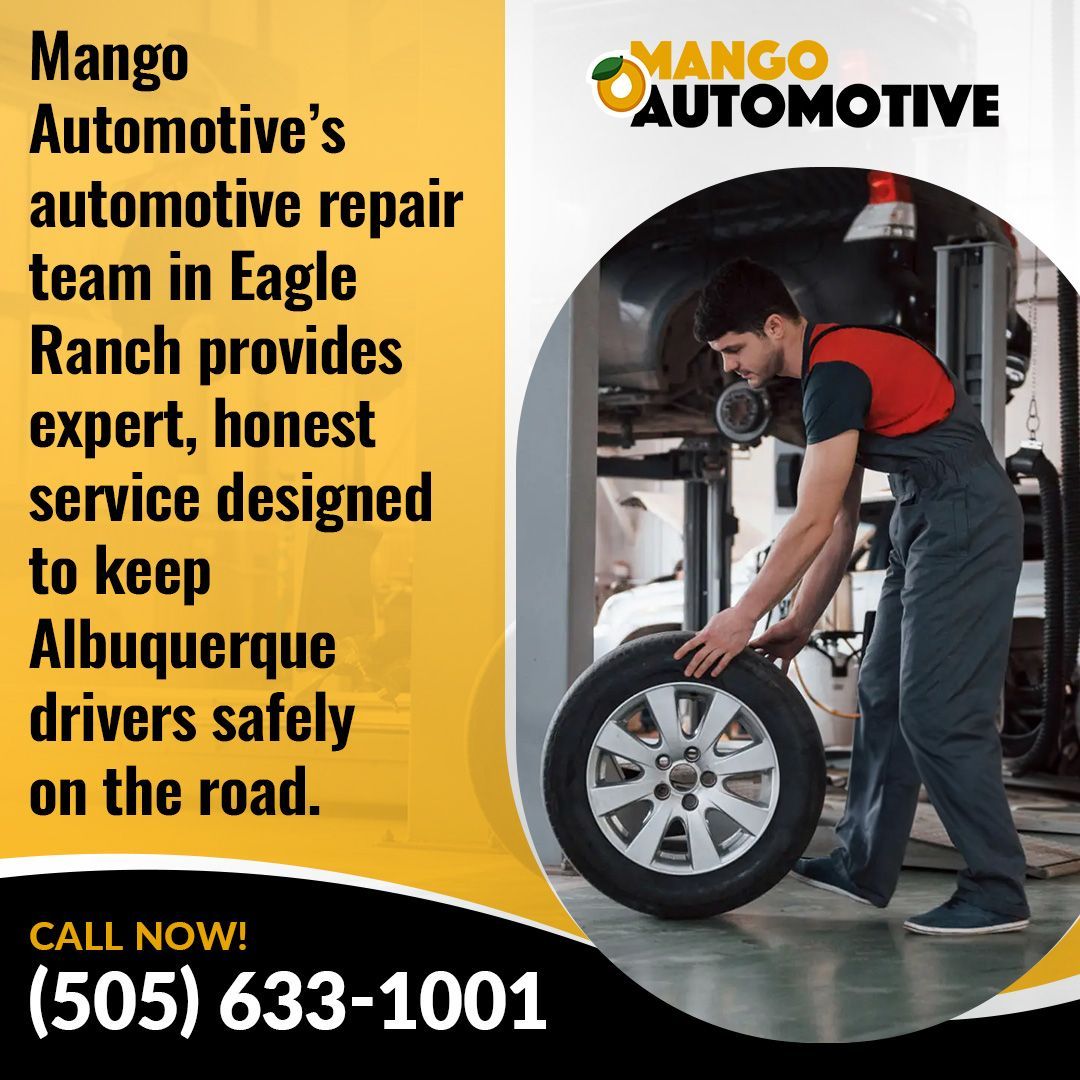
Visit Mango Automotive for Eagle Ranch Auto Repairs
Understanding the unique repair needs of SUVs versus sedans is essential for keeping your vehicle in good condition. At Mango Automotive, we offer specialized services tailored to the distinct demands of each vehicle type, from suspension systems to brake services and fluid checks. We make sure your car gets the care it needs for safe, efficient performance.
With our expert auto repair technicians, advanced diagnostic tools, and customized repair plans, Mango Automotive is committed to providing the best service for every vehicle type. Regular maintenance, timely repairs, and understanding your driving habits help prolong your vehicle’s lifespan and prevent costly breakdowns.
For expert
Eagle Ranch auto repairs, trust Mango Automotive. Whether it’s a suspension issue, brake service, or routine fluid check, our team is here to make sure your vehicle performs at its best.
Don’t wait for small issues to turn into big repairs. Contact us today at
(505) 633-1001 to schedule your next service and experience the difference of expert auto care in Albuquerque. Let Mango Automotive keep you safely on the road!
